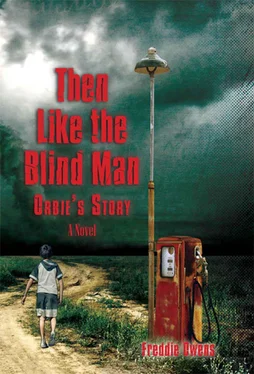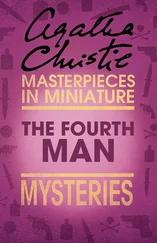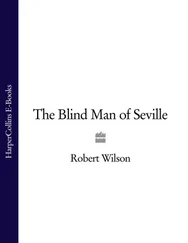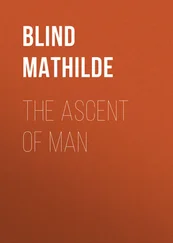Freddie Owens
THEN LIKE THE BLIND MAN
Orbie’s Story
A Novel
In memory of Charley and Clara Kissel
And to Albert and Vela Wegela
And to Karen;
Were it not for them not a word
Would I have written.
It should first be noted that this book is a work of fiction. Names, characters, places and incidents are wholly imaginary and are used fictitiously. Any resemblances (of which there may be a few) to actual events or locales or persons, living or dead, is entirely coincidental.
That having been said, two memories served as starting points for a short story I wrote that eventually became this novel. One was of my Kentucky grandmother as she emerged from a shed with a white chicken held upside down in one of her strong bony hands. I, a boy of nine and a “city slicker” from Detroit, looked on in wonderment and horror as she summarily wrung the poor creature’s neck. It ran about the yard frantically, yes incredibly, as if trying to locate something it had misplaced as if the known world could be set right again, recreated, if only that one thing could be found. And then of course it died. The second memory was of lantern light reflected off stones that lay on either side of a path to a storm cellar my grandparents and I were headed for one stormy night beneath a tornado’s approaching din. There was wonderment there too, along with a vast and looming sense of impending doom. For these and many others of my childhood memories I must thank my grandparents. Had I not been exposed to their homespun, wizened and sometimes carping ways I would not have been able to begin my short story much less this novel. The same goes for my dear, good-hearted parents who survived the bad times to enjoy the good.
I also want to thank Judith Guest ( Ordinary People ) and especially Rebecca Hill ( Among Birches ) for early and crucial writing guidance. Without their unsparing feedback and mentorship I might not have dealt adequately with the “false and unlikely” as it was wont to manifest in the early drafts of the manuscript.
Literary agents Ned Leavitt and Robin Mizell deserve special thanks for their deft editorial comments and for the considerable time and energy they invested in making them. I must extend kudos to Dave King as well for a thoroughly professional editing of the manuscript. (Google Dave King Editorial Services and his book Self-Editing for Writers. ) No writer I feel would manage long without such editorial guidance as Dave King provides.
I also want to acknowledge support and guidance received of editors Tom Jenks and Winn Blevins ( Stone Song ), painter and tea master Shoshana Cooper, writer Rabbi David Cooper ( God Is A Verb ) and Boulder psychologist Ina Robbins. Thanks also to all those good friends and writing workshop attendees who gave this work their studied and undivided attention.
Inspiration came also from years of counseling sex offenders and those prone to domestic violence and from a life of spiritual seeking, which led to encounters with Native American Shamanism, Advaita Vedanta, Tibetan Buddhism and the teachings of Chogyam Trungpa Rinpoche and Sri Nisargadatta Maharaj.
Finally and most importantly, this book would not have been possible at all without the help and unflagging support of my loving wife and lifelong helpmate, author and psychologist Karen Kissel Wegela ( The Courage to Be Present ).
You could say what happened to me happened to all of us. It happened to Victor, to Momma and Missy, Granpaw and Granny, to Moses Mashbone, to Willis, to Nealy Harlan and that old cousin of his, Bird Pruitt — to all the folks that lived and worked around Harlan’s Crossroads, white and black. And I suppose you would be right in putting it that way, though you would be wrong too, dead wrong, for what happened was also altogether particular to my person alone; particular and so elusive, so hard to get hold of that few in this world, least of all myself — though I had been given a glimpse to last a lifetime — would dare say it had happened at all.
Some said it was magic. Some said no. Some said what destroyed the barn and tore the wheels off Reverend Pennycall’s police car was just a late summer storm, though of unusual magnitude, which at the time seemed a reasonable enough explanation. But the thing that put the slice of worry permanently between Momma’s eyes and pointed out the path I was to take — the thing that sent the Devil to his grave — that was more than just a storm.
Part One

Thursday, June 6 th1959
Momma and even Victor said I’d be coming to St. Petersburg with them. They’d been saying it for weeks. Then Victor changed his mind. He was my stepdaddy, Victor was. It would be easier on everybody, he said, if I stayed with Granny and Granpaw in Kentucky. Him and Momma had enough Florida business to take care of without on top of everything else having to take care of me too. I was a handful, Victor said. I kept everybody on edge. If you asked me, the only edge everybody was kept on was Victor’s. As far as I was concerned, him and Momma could both go to hell. Missy too. I was fed up trying to be good. Saying everything was okay when it wasn’t. Pretending I understood when I didn’t.
Momma’s car was a 1950 model. Daddy said it was the first Ford car to come automatic. I didn’t know what ‘automatic’ was but it sure had silver ashtrays, two of them on the back of the front seats. They were all popped open with gum wrappers and cigarette butts and boy did they smell.
One butt fell on top a bunch of comic books I had me in a pile. The pile leaned cockeyed against my dump truck. Heat came up from there; little whiffs of tail pipe smoke, warm and stuffy like the insides of my tennis shoes.
It rattled too — the Ford car did. The glove box. The mirrors. The windows. The knobs on the radio. The muffler under the floorboard. Everything rattled.
We’d been traveling hard all day, barreling down Road 3 from Detroit to Kentucky. Down to Harlan’s Crossroads. I sat on the edge of the back seat, watching the fence posts zoom by. Missy stood up next to the side window, sucking her thumb. The fingers of her other hand were jammed between her legs. She was five years old. I was nine.
I’d seen pictures of Florida in a magazine. It had palm trees and alligators and oranges. It had long white beaches and pelicans that could dive-bomb the water. Kentucky was just old lonesome farmhouses and broke back barns. Gravel roads and chickens in the yard.
Road 3 took us down big places like Fort Wayne and Muncie. It took us down a whole bunch of little places too, places with funny names like Zaneville and Deputy and Speed.
Missy couldn’t read.
“Piss with care,” I said.
“Oh Orbie, you said a bad word.”
“No. Piss with care, Missy. That sign back there. That’s what it said.”
Missy’s eyes went wide. “It did not. Momma’ll whip you.”
Later on we got where there was a curve in the road and another sign. “Look Missy. Do not piss.”
Читать дальше















